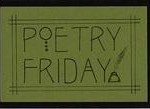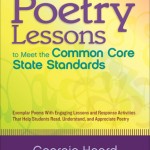A recent post by Tara Smith over at Two Writing Teachers inspired me to reflect on my out routines and rituals around making poetry an every day part of my instruction, rather than contained in a unit of study to be taught at a specific time of year. Thanks, Tara, for a great post!
Sylvia has the round-up this week over at Poetry for Children. This week, my poem for
is a poem I wrote a few years ago after attending a summer writing institute at Teachers College Reading and Writing Project. Ralph Fletcher gave a terrific keynote and took participants through a few writing exercises that I have since used a lot with my students.
The Good Old Days
Sometimes I remember
The good old days
Riding to Jones Beach in our big, black Chrysler
With my four brothers and sisters
Each of us standing
Shoulder to shoulder across the capacious back seat
I run across the white -hot sand
Twirling in my plaid skirted swimsuit
Dad gives us all
a “ready-set-GO!” and we
Race to the water
I still can’t imagine
Anything better than that.
by Maureen Nosal (inspired by Ralph Fletcher)
Ralph had read his own poem, The Good Old Days, and encouraged us to use his first and last two lines and write our own memory in between. It was a fun, thoughtful, and successful endeavor for most, and I thought about how fun it would be to write this poem with my 5th graders.
This year, I had a student who lost his big brother in an unspeakably tragic incident. He was having a hard time and did not want to talk about it with anyone. When we started working on our own Good Old Days poems, he suddenly wanted to write about a memory of happy times with his brother. He wrote a beautiful poem and the act of working on it gave me an opportunity to talk with him a little about the healing power of writing. He gave me a beautiful smile and asked if he could publish his poem. It was a most fulfilling writing conference, as you can imagine.
You can find this short writing exercise in Ralph’s book Mentor Author, Mentor Texts, at Heinemann.
So, how does poetry fit into my school year? I start on Day One with a poem that we will work on for the week. My students keep a poetry folder and get a poem every Monday that we will take time to read and unpack each morning at the end of Morning Meeting (my Shared Reading time). Students work with the poem, reading, rereading, and annotating all week during morning work and for homework. I follow a structure from Georgia Heard’s terrific book, Poetry Lessons to Meet the Common Core Standards to implement a 5 day weekly routine. If you do not have this book, you need it! It is a practical and, despite its clunky title, inspirational. I have found countless ways to work with poems. From Goodreads:
Favorite poet and author Georgia Heard shares step-by-step poetry lessons that guide students to identify figurative language, hear rhyme, rhythm, and other poetic conventions, and explore imagery and theme—and then determine how these elements deepen their understanding of the poem. Students gain a thorough knowledge of poetic elements, which helps them meet Common Core State Standards in literature and language. Includes model poems, response activities, and performance tasks! For use with Grades K-5. (less)
If you are familiar with Georgia Heard’s work from Awakening the Heart, you are sure to be delighted with this resource. I like to use both books. I think of Awakening the Heart as more of a writing resource, and Poetry Lessons to Meet the Common Core Standards as more of a close reading resource.
We often illustrate poems, or favorite parts of poems, and sometimes these illustrations live in our folders, or sometimes they live on our classroom walls.
Poetry brings us together as a community of readers, writers, and thinkers. While I’ve enjoyed working out ways to use poetry for daily reading these past few years, I haven’t done as much with writing poetry on a regular basis. This year, I am going to find small ways to tuck in a poetry writing routine. I learned a lot last year with my predominately English language learners about the payoff with poetry writing for language development. I will be posting more about this topic and my experiences as I work it into instruction this year.
Here are a few of my favorite poetry books:






7 Comments
Leave a reply →